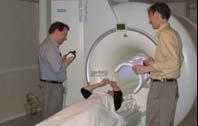Trauma-Related Substance Abuse Persists After Mental Health Symptoms Abate
Mental health symptoms that New York City residents developed following the September 11, 2001, terrorist attacks resolved significantly within 9 months, but residents continued to report elevated levels of tobacco, marijuana, and alcohol use. Rates of depression and posttraumatic stress disorder (PTSD), which were high 1 to 2 months after the attacks, dropped in 6 to 9 months, NIDA-funded researchers found in a followup survey. Substance abuse rates, however, which also were elevated 1 to 2 months after the attacks compared with preattack levels, did not decline substantially.

Dr. David Vlahov and his colleagues at the New York Academy of Medicine conducted telephone interviews of 1,570 randomly selected adults between 6 and 9 months after September 11. Nearly 10 percent of participants reported smoking more cigarettes in the month before the survey than they remembered smoking in the month before the attacks, while 17.5 percent said they drank more alcohol and 2.7 percent said they smoked more marijuana—elevations similar to those reported by a different group of New York City residents 1 to 2 months after the event (see "Depression, PTSD, Substance Abuse Increase in Wake of September 11 Attacks," NIDA NOTES, Vol. 17, No. 4).
In the study conducted 1 to 2 months after the event, Dr. Vlahov and colleagues had interviewed people who lived close to the World Trade Center. To compare the results of that study with the current findings, the researchers analyzed the responses of 854 people from the same area of the city. Participants reported a dramatic drop in PTSD symptoms, from 7.5 percent to 0.6 percent, and in symptoms of depression, from 9.7 percent to 5.3 percent, compared with the earlier study group.
For the entire group of participants, key findings on the relationship between mental health symptoms and substance abuse 6 to 9 months after the disaster are:
- More individuals who increased their smoking reported current PTSD symptoms (4.3 percent) compared with those who did not (1.2 percent).
- Symptoms of depression were more common among those who increased substance use compared with those who did not: 14.6 versus 5.2 percent for smoking, 11.8 versus 5.2 percent for drinking, and 34.1 versus 5.3 percent for marijuana abuse.
- Fifteen percent of those directly affected by the attacks smoked more cigarettes, compared with 8 percent of those not directly affected.
Source
- Vlahov, D., et al. Consumption of cigarettes, alcohol, and marijuana among New York City residents six months after the September 11 terrorist attacks. American Journal of Drug and Alcohol Abuse 30(2):385-407, 2004.
[Abstract]
NIDA Support Brings First fMRI to South Africa
 Dr. David Olson, left, of the Brain Imaging Center, McLean Hospital, Harvard Medical School, and Dr. Paul Carey, MRC Unit on Anxiety and Stress Disorders, prepare to test Africa's first fMRI system, installed with NIDA funding.
Dr. David Olson, left, of the Brain Imaging Center, McLean Hospital, Harvard Medical School, and Dr. Paul Carey, MRC Unit on Anxiety and Stress Disorders, prepare to test Africa's first fMRI system, installed with NIDA funding.South Africa's Tygerberg Academic Hospital now has the continent's first functional magnetic resonance imaging (fMRI) system. The machine was installed in November 2004 as part of an ongoing NIDA-funded collaboration between McLean Hospital, Harvard Medical School, and the South African Medical Research Council (MRC) Unit on Anxiety and Stress Disorders at the University of Stellenbosch, Tygerberg, South Africa.
With the new fMRI system, MRC researchers have a state-of-the-art tool they can use to observe people's brain activity under a variety of conditions. Dr. Deborah A. Yurgelin-Todd of Harvard and Dr. Paul Carey of the MRC plan to use the system to compare marijuana abusers' and control subjects' brains as they make decisions and perform tasks involving behavior inhibition and memory. Dr. Yurgelin-Todd and her colleagues have trained their MRC colleagues in use of the fMRI and the project's protocol. To facilitate collaboration and the analysis and interpretation of their results, investigators in both countries will deposit their data in a shared database.
